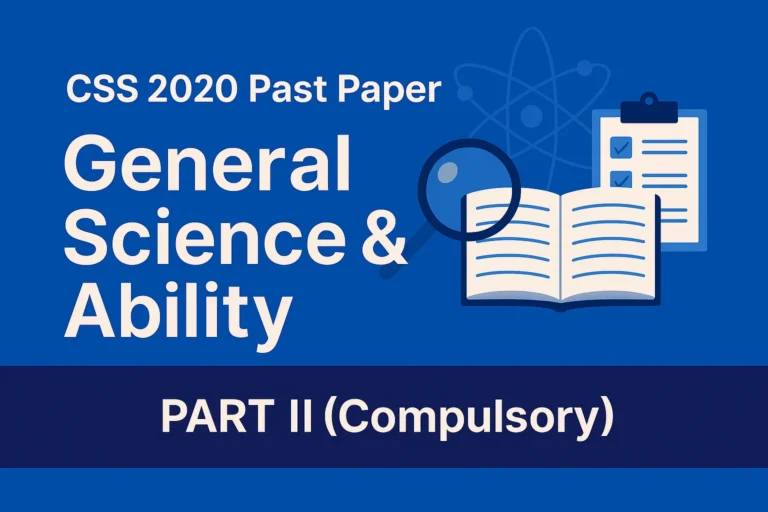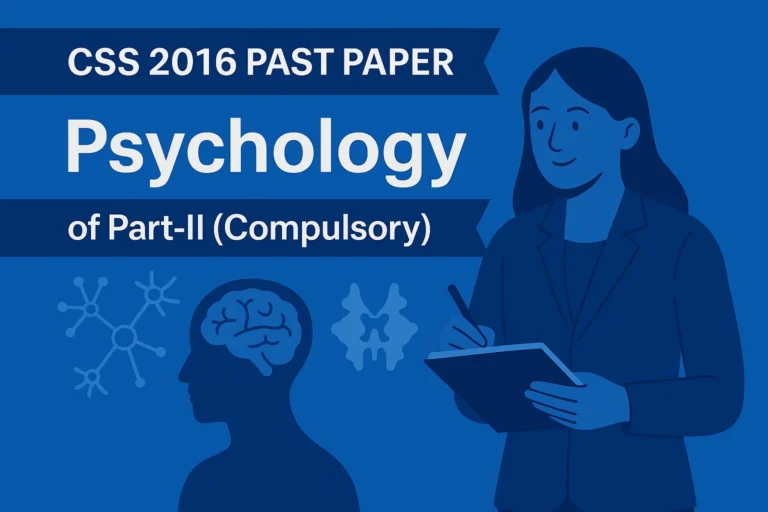What Should be the Medium of Instruction: Urdu or English?
(English Essay – CSS & PMS)
Outline
- Introduction
- Medium of Instruction in Developed Countries
- Importance of National Language in Education
- Lack of Progress through Foreign Medium
- Lessons from China and Japan
- Illustration from “The Last Lesson”
- National Language and Cultural Identity
- The Quranic Perspective on Language
- Current Dual Streams of Education in Pakistan
- Problems of English vs. Urdu Divide
- The 1973 Constitution and Urdu as National Language
- National Thinking and Attitude towards Urdu
- Conclusion
Introduction
By medium of instruction is meant the language in which instruction is imparted at different levels of education in a country. In developed countries, medium of instruction is in their own language. All subjects from the primary to the highest university levels are taught in the medium of French. In Germany, German is the language of teaching, while in China and Japan, in both China and Japan, the native languages—Chinese and Japanese—are used as the primary mediums of instruction across all stages of education, starting from the earliest grades and continuing through higher education.
Medium of Instruction in Developed Countries
Both the British and the Americans use English as the language of instruction across all stages of education. Living nations are jealous of their languages, which they follow in all kinds of educational institutions, right from primary to the university levels. Their languages open up fresh vistas of thinking and that helps to increase the flow of knowledge. The latest literature in different scientific fields proliferates in the advanced countries in different languages and is immediately transmitted to national languages.
That is how the cycle of research widens over time. Adequate arrangements exist in the developed countries to translate the foreign researches in the national languages to keep their nationals abreast of the latest trends in different fields of research. The American, the British, the French researches done is immediately rendered into the Chinese language in case of China. It further extends the scope of researches in such countries. The latest literature thus is made available in the national languages to facilitate the research work.
The developed countries lay primary emphasis on their languages, which further widens the thinking horizon of their nationals. They feel proud of their languages, which unfold the national creative talent. Each sovereign nation develops its own system of education, often choosing to use its native language as the medium of instruction across all academic levels.
Importance of National Language in Education
It may be pointed out that one’s own language is for progress. True progress can only be achieved through one’s own language. No nation in history has advanced by relying solely on a foreign language as the medium of growth and development. No nation can develop without its own brain power, which, in fact, is its language power. The longer it avoids the use of its own language power, the longer it will have to face the agony of mental poverty and distress.
A person cannot walk using someone else’s legs, see through another’s eyes, or speak with another’s tongue. In the same way—perhaps even more so—he cannot truly think using another person’s language or mind. These are bare facts, which cannot be denied.
Lack of Progress through Foreign Medium
The remarkable development of China and Japan can largely be attributed to the intellectual strength fostered through their native languages. Japan, often described as the land of rising prosperity, owes much of its economic success to its strong foundation in science and technology. These fields have advanced significantly, in part because the Japanese language has served as a powerful medium for learning, innovation, and progress. China has achieved the highest growth rate, which stands facilitated by human capital formation. China’s economic progress is due to the teaching of modern knowledge of economics and technology in the medium of the Chinese language. Therefore, the role of the national language as a medium of instruction cannot be overlooked or underestimated.
Lessons from China and Japan
Incidentally, a mention may be made of a short story titled The Last Lesson which has a great bearing on the importance of national language. There is a pupil who does not attend classes regularly and shows little interest in the learning of the French language. The teacher is a hard taskmaster.
The pupil moves in the class rather stealthily so that the teacher could not detect him. The teacher, however, spots him out and this time he does not treat the pupil rather harshly. He tells the class that it is the last lesson he is delivering, which all pupils should listen to attentively.
Germany has captured France, and now the position of the latter has become unenviable. The teacher, pointing towards Mr. Franz says: “Now you will learn German language and past with your own. The learning of German language would take you from your own language and culture. The loss of your own language means mental slavery. Remember, the key to come out of slavery lies in the French language.”
The lesson has a great value for Pakistan. It is through one’s mother language that one can gain proficiency in different fields of life.
Illustration from “The Last Lesson”
Incidentally, a mention may be made of a short story titled ‘The Last Lesson’ which has a great bearing on the importance of national language. There is a pupil who does not attend classes regularly and shows little interest in the learning of the French language. The teacher is a hard taskmaster.
The pupil moves in the class rather stealthily so that the teacher could not detect him. The teacher, however, spots him out and this time he does not treat the pupil rather harshly. He tells the class that it is the last lesson he is delivering, which all pupils should listen to attentively.
Germany has captured France, and now the position of the latter has become unenviable. The teacher, pointing towards Mr. Franz says: “Now you will learn German language and past with your own. The learning of German language would take you from your own language and culture. The loss of your own language means mental slavery. Remember, the key to come out of slavery lies in the French language.”
The lesson has a great value for Pakistan. It is through one’s mother language that one can gain proficiency in different fields of life.
National Language and Cultural Identity
In the light of the experience of the developed countries, it is through the national language that one can acquire specialization in different fields of knowledge. No one can refute this fact. If one visits France, one is supposed to communicate in the French language to the people. If French knows English, he would not like to address you in English. He would speak the French language.
Mother language is held in the highest esteem and is regarded as a matter of pride in the aforementioned countries. The elite classes in Pakistan denigrate their own language and culture. We should take guidance from the experiences of developed nations in order to strengthen our own national language, Urdu, and gradually implement it as the medium of instruction across all levels of education.
No damage greater can be done than suppressing the natural expression of a nation, no weapon can be as effectively used by a foreign ruler as imposition of a foreign language on their subjects to enslave them.
The Quranic Perspective on Language
It would not be amiss to quote the Holy Quran, which upholds the mother tongue as a fundamental medium of education:
“Never have we sent a messenger except in the language of his people.” (Surah 14, Verse 4)
It gives a clear direction that the messenger would speak to the people in their language to convey the message of God.
A messenger is a teacher of Divine Wisdom, which encompasses all spheres of life, and, therefore, the basic principle of all teaching is the use of the mother tongue. It establishes the importance of mother language to act as medium of instruction.
Current Dual Streams of Education in Pakistan
It’s rather most unfortunate that there are two distinct streams of education running in Pakistan: One is Urdu medium and the other English medium. The schools/colleges run in the public sector impart instruction up to the secondary/degree levels in Urdu.
Most of the social disciplines like History, Political Science, Economics, Sociology are taught in Urdu, though at the university level there is a mix use of Urdu and English in the teaching of these disciplines. Physical sciences like Mathematics, Botany, Zoology, Statistics are taught in English even at the degree levels. Institutions like Beacon House School System, City School, Grammar Schools follow the Western type of Syllabi and the medium of instruction is English.
Problems of English vs. Urdu Divide
Children coming of elite classes mostly join the English medium schools. They receive their education in English. They get an edge over boys/girls schooled in Urdu medium schools, especially in the competitive examinations like the CSS, PMS, etc. In the competitive examinations, candidates with a good background in English excel over the candidates flowing out of the Urdu medium schools. Hence minority comes to have ascendancy over majority, because the English is the medium of expression in the competitive examinations.
This distinction between English and Urdu medium schools in a way goes against the idea of national unification.
The 1973 Constitution and Urdu as National Language
It was laid down in the 1973 Constitution that within ten years after the promulgation of the constitution Urdu would be adopted as the national language. Urdu would also be declared as the official language. This has not happened even after a lapse of thirty years.
There are certain reasons behind the non-adoption of Urdu as national language. The bureaucracy in the higher echelons, and the elite classes comprising the feudals, the industrialists, the retired civil and military bureaucrats are opposed to the adoption of Urdu as a national language.
English confers on their status. Boys/girls coming out of English medium schools mostly exhibit ignorance and abhorrence for their own culture. Thus, the community is split up between two classes: minority speaks English, majority speaks Urdu. It is a dangerous trend viewed from the nationalistic angle.
National Thinking and Attitude towards Urdu
A community should speak the same language, as a language does not belong to an individual, it always belongs to a people; the group that uses any given language is called the speech community with its distinct culture. Since man is a thinking animal and thinks in words, his entire enterprise, profession and vocation can advance most speedily when the vehicle of his thought is also the vehicle of acquiring knowledge and conducting transactions in it.
Let it be stated without any fear that English does not breathe through us, Urdu does breathe through us, because it is much nearer to the local dialects spoken in the country.
Conclusion
Considering the facts discussed above, it is strongly recommended that Urdu should be adopted as the primary medium of instruction at all stages of education. At the same time, English and other international languages—such as French, Russian, German, Japanese, and Chinese—should also be taught to broaden access to global knowledge. Alongside this, proper mechanisms must be established to translate and transfer scientific and technical material from foreign languages into Urdu.
Such a step requires a shift in our national mindset and collective attitude. Once Urdu is formally recognized and implemented as the medium of instruction across all educational levels, the language itself will gradually evolve and strengthen.
Like a flowing stream, a language naturally overcomes the obstacles it encounters. Over time, it expands its reach and develops the depth and width necessary to carry the knowledge of a nation forward.
Click here to find more articles on English Essay.






